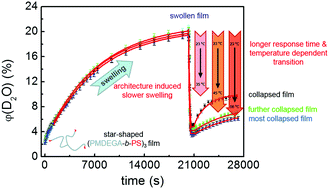Effect of chain architecture on the swelling and thermal response of star-shaped thermo-responsive (poly(methoxy diethylene glycol acrylate)-block-polystyrene)3 block copolymer films†
Abstract
The effect of chain architecture on the swelling and thermal response of thin films obtained from an amphiphilic three-arm star-shaped thermo-responsive block copolymer poly(methoxy diethylene glycol acrylate)-block-polystyrene ((PMDEGA-b-PS)3) is investigated by in situ neutron reflectivity (NR) measurements. The PMDEGA and PS blocks are micro-phase separated with randomly distributed PS nanodomains. The (PMDEGA-b-PS)3 films show a transition temperature (TT) at 33 °C in white light interferometry. The swelling capability of the (PMDEGA-b-PS)3 films in a D2O vapor atmosphere is better than that of films from linear PS-b-PMDEGA-b-PS triblock copolymers, which can be attributed to the hydrophilic end groups and limited size of the PS blocks in (PMDEGA-b-PS)3. However, the swelling kinetics of the as-prepared (PMDEGA-b-PS)3 films and the response of the swollen film to a temperature change above the TT are significantly slower than that in the PS-b-PMDEGA-b-PS films, which may be related to the conformation restriction by the star-shape. Unlike in the PS-b-PMDEGA-b-PS films, the amount of residual D2O in the collapsed (PMDEGA-b-PS)3 films depends on the final temperature. It decreases from (9.7 ± 0.3)% to (7.0 ± 0.3)% or (6.0 ± 0.3)% when the final temperatures are set to 35 °C, 45 °C and 50 °C, respectively. This temperature-dependent reduction of embedded D2O originates from the hindrance of chain conformation from the star-shaped chain architecture.



 Please wait while we load your content...
Please wait while we load your content...